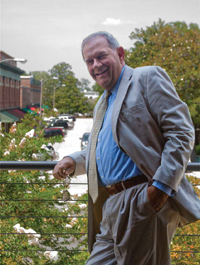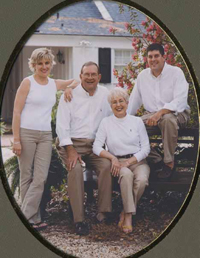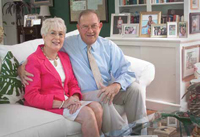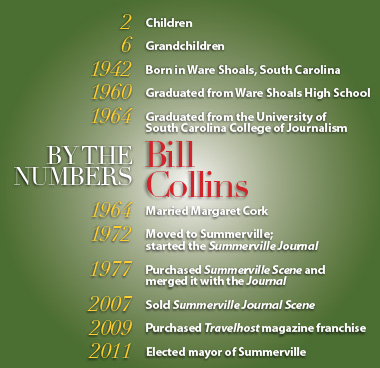 Summerville is a special place, and I will work with every ounce of my being to make sure it remains a special place.” Those words were spoken by Bill Collins after the announcement that he had been elected mayor.
Summerville is a special place, and I will work with every ounce of my being to make sure it remains a special place.” Those words were spoken by Bill Collins after the announcement that he had been elected mayor.
“There’s a lot to be done. And it’s going to take the efforts of a lot of people. I just want to be one of those people doing whatever I can to help,” said Collins a couple of weeks later.
The publisher of the Summerville newspaper for 35 years – he sold it in 2007 – Collins ran for mayor for two reasons: his attitude toward life and the realization that the slower pace of semi-retirement didn’t match his personality or his energy level.
“I’m sort of an A-type personality, maybe triple-A. I’m full of energy and enthusiasm,” he explained. “And I love the town and love the people. It had been supportive of me, the newspaper and our family. I was in the position to give back, and I think if you can give back, that’s what you need to do. The city is only as good as the people who inhabit it and who are willing to make it better.”
Collins took office on June 20, 2011, following Berlin G. Myers, who had served since 1972. Myers believed his most important accomplishments were keeping the “village” in fast-growing Summerville and beginning the Berlin G. Myers Parkway. Collins wants to continue that legacy. His priorities are serving the town’s residents with better infrastructure and economic development.


“Years ago my grandmother told me, ‘Billy, remember the Lord gave you two ears and one mouth. Listen more than you talk and you’ll learn a lot.’ I listened during the mayoral campaign. People said, ‘Help us find a solution to this traffic.’
“The traffic is atrocious and it’s on everybody’s mind. It impacts everything we do,” Collins continued.

Collins also plans to speak with some of the area’s major employers about staggering their work hours, which could help alleviate the heaviest congestion on Interstate 26.
“A 45-minute or one-hour change would not significantly affect people’s schedules but could make a lot of difference in the time it takes to get to their jobs. And it would cost no money. It’s a creative solution,” said Collins.
The Berlin G. Myers Parkway has been in the works since the 1970s, and Collins thinks it’s critical to finish it. He explained that MeadWestvaco Corp. is already developing East Edisto, the 78,600 contiguous acres of company-owned land along the eastern edge of the Edisto River in Charleston and Dorchester counties.
“If that continues without another way through town other than 17A, 10 years from now, you won’t be able to get through this town. So I think it has to be done,” said Collins.
Other plans to alleviate traffic congestion include widening Bacons Bridge Road. Long-range, he believes the Glenn McConnell Parkway should be extended from Bees Ferry Road into Dorchester County and tie into Orangeburg Road so residents can get onto Interstate 26 using the planned Jedburg Road interchange, near Sheep Island Road, instead of all the Interstate traffic being at the North Main Street interchange, as it is now.
Another priority is for Summerville to become more business friendly. Collins wants to work with established businesses, but he also understands how important recruiting new commerce is to the future of Summerville. He hopes to grow the town’s revenue by nourishing growing businesses and attracting new companies with tax credits. Collins knows the town must target the right type of businesses, those that will partner with Summerville to preserve its beauty and history.
He plans to work with the economic development team to attract new job opportunities for area residents, specifically in the high-tech industry. Collins intends to spend most of his time outside Town Hall, recruiting businesses and working with other regional leaders and organizations, such as the Charleston Regional Development Alliance.
To build on Summerville’s current tourism industry and to take advantage of the more than 6 million visitors who come to the Charleston area each year, Collins intends to reach out to the cruise industry. He would like to arrange one-day bus excursions for passengers to come from Charleston to tour the historic sites around Summerville. “We have homes that could be available for tours. We have a collection of outdoor sculptures that very few cities our size have, in the parks and around town. We have a little theater. We have a museum and a community orchestra. We’ve got a lot of stuff. We just have to put that all together so when (tourists) come here, we can show it to them in the right way.
“We also should take advantage of the history of football. We have the winningest high school program ever here. A lot of people are interested in that. Nobody will ever touch that (record) again ‘cause it’s something that can’t be matched. That is something that people would like to see.”
Collins admits it is going to take some energy and effort, but he believes the town has a lot to offer to cruise passengers and other tourists. Once they experience Summerville, enjoying the shops and restaurants, they will leave with a good feeling about the town. Summerville will expand its reputation as a popular vacation spot, and tourism will grow.
Another idea Collins has to increase tourism is to attract a boutique hotel to the downtown area, allowing more visitors to stay in the historic district and walk to the nearby shops, galleries and restaurants. He believes that with more guest room capacity, Summerville can increase its marketing to other South Carolina residents as a short-trip destination.
Collins would like to attract some four- and five-story buildings to the downtown area, with shops and stores on the ground level and office space and condominiums or apartments above so people can live downtown.
 “We’ve got a population that’s aging. I think a lot of seniors would love the opportunity to be downtown where you can walk to do things here. I just see the community changing. We don’t want to abuse or destroy the character and the ambience that we have; we want to enhance it,” said Collins.
“We’ve got a population that’s aging. I think a lot of seniors would love the opportunity to be downtown where you can walk to do things here. I just see the community changing. We don’t want to abuse or destroy the character and the ambience that we have; we want to enhance it,” said Collins.
While much of the town’s growth is occurring outside the town center, Collins thinks the downtown district can be maintained. It can be unique, with its own flavor and its own attractions. When the Berlin G. Myers Parkway is completed, residents who are not coming downtown to shop or eat will be able to get to their homes on the other side of town without using Main Street, decreasing the traffic through the downtown area and making it more pedestrian-friendly.
Summerville is large now. The city limits extend from Interstate 26 to Oakbrook and from the interstate to Knightsville. Collins knows that along those roads there are miles of property that are not part of the town, and annexation is on his agenda. He also wants to grow the opportunities in these areas and other parts of the city.
“It’s not just about the central business district. Oakbrook needs attention. The Knightsville area needs attention. North Summerville, the quadrant above the railroad track, needs attention. There’s a lot to be done,” said Collins.
He also understands the need for Summerville’s citizens to come together as a community.
“You know, we have this tradition of Friday night football that is a big, big deal here. I’d like to see us develop a tradition of concerts in the park for Friday’s during the summer, so that families can come together and listen to music and enjoy each other’s company.”
A lot has been said about 2011’s mayoral change being the “beginning of a new era” in Summerville. Collins hears the term and expresses his opinion with respect for what has come before.
“I think Summerville has a wonderful history and a very proud past, but I think it has an even more promising future,” he said. “We are almost at the stage where we are about to unleash this kind of sleeping community. … We want to see the city become an even more vibrant and an even more special place to live than we already think it is.
“People are eager to see things happen. If we can get people to come together to work on these things, I think we can have some fun making things happen and have a new and improved Summerville.
“I want to invite public input. I want the citizens to realize that we work for them. This isn’t about Bill Collins, and it isn’t about the new (town) council; it’s about their city and what they want it to be. … And I think it’s going to be exciting.”